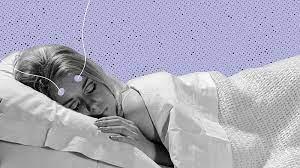Insomnia, a common sleep disorder, can disrupt your ability to fall asleep, stay asleep, or both, leading to significant daytime fatigue, irritability, and impaired functioning. Recognizing its symptoms and seeking appropriate treatment is crucial for restoring healthy sleep patterns and overall well-being.
Difficulty Falling Asleep
Persistent tossing and turning at bedtime, often accompanied by racing thoughts or anxiety.
Frequent Awakening
Waking up multiple times during the night and struggling to return to sleep.
Early Morning Awakening
Waking up earlier than desired and finding it challenging to go back to sleep.
Non-Restorative Sleep
Feeling unrested and fatigued despite spending sufficient time in bed.
Daytime Fatigue
Experiencing excessive daytime sleepiness, low energy levels, and difficulty concentrating.
Irritability and Mood Changes
Increased irritability, mood swings, and heightened emotional sensitivity.
Cognitive Impairment
Difficulty with memory, concentration, and decision-making due to inadequate sleep.
Physical Symptoms
Headaches, gastrointestinal discomfort, and muscle tension can be exacerbated by chronic sleep deprivation.
Treatment Options for Insomnia
Sleep Hygiene Practices
Establishing a consistent sleep schedule, creating a relaxing bedtime routine, and optimizing your sleep environment can promote better sleep quality.
Cognitive Behavioral Therapy (CBT-I)
This structured therapeutic approach helps identify and modify negative thoughts and behaviors that contribute to insomnia, promoting healthier sleep habits.
Stress Management Techniques
Practicing relaxation techniques such as deep breathing, meditation, and progressive muscle relaxation can reduce anxiety and facilitate sleep onset.
Limiting Stimulants
Minimizing consumption of caffeine, nicotine, and alcohol, particularly close to bedtime, can improve sleep quality.
Regular Exercise
Engaging in regular physical activity, preferably earlier in the day, can enhance sleep quality and promote relaxation.
Medications
In some cases, short-term use of sleep aids or sedatives may be prescribed by a healthcare provider to alleviate acute insomnia symptoms. However, these should be used cautiously and under professional supervision due to the risk of dependency and adverse effects.
Addressing Underlying Conditions
Treating underlying medical or psychiatric conditions, such as depression, anxiety, or sleep apnea, can significantly improve sleep quality.
Seeking Professional Help
If insomnia persists despite self-care efforts, consulting a healthcare provider or sleep specialist is advisable to identify underlying causes and develop a personalized treatment plan.
Conclusion
Insomnia can have a profound impact on both physical and mental well-being, but effective treatment strategies are available to address its symptoms and improve sleep quality. By adopting healthy sleep habits, seeking appropriate therapeutic interventions, and addressing contributing factors, individuals can regain control over their sleep and experience the restorative benefits of a good night's rest. If you're struggling with insomnia, don't hesitate to reach out to a healthcare professional for support and guidance tailored to your needs.


